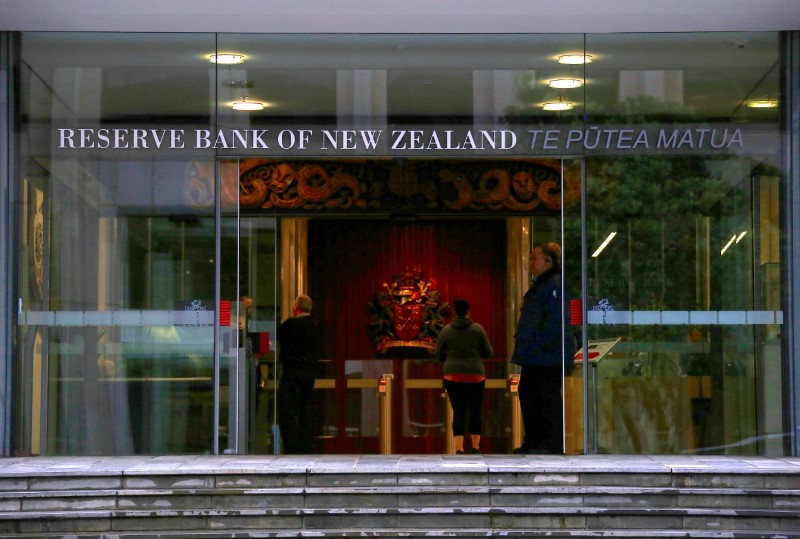* RBNZ prepared for "unconventional policy" in case of crisis
* RBNZ discussed 5 most viable policy options to deal with crisis
* Options include negative cash rate, asset purchase
* New Zealand dlr hits day's low after the news (Adds details from research paper, updates levels for NZ dlr)
By Swati Pandey
SYDNEY, May 23 (Reuters) - New Zealand's central bank could slash interest rates into "modestly negative territory" and undertake large-scale asset purchases in case of a major financial crisis, it said in a research paper on Wednesday.
In an interview with Bloomberg following the release of the paper, RBNZ Assistant Governor John McDermott said while there's "no imminent prospect" of using such measures, "the probability of needing them at this point in the cycle is higher than it ever was in history."
"It would be silly of us not to be ready just in case," he told Bloomberg.
The New Zealand dollar fell to a session low of $0.6901 on the news, from a one-week top of $0.6974 touched on Tuesday.
The RBNZ weathered the global financial crisis without having to push rates to zero or into negative territory, unlike its peers in Europe, Japan and the United States.
The central bank last cut rates to a record low 1.75 percent in late 2016 and has repeatedly indicated the need for policy to remain stimulatory as inflation remains tepid. is "significant further room" to ease policy if needed, although the central bank is not currently projecting a "significant decrease" in interest rates, it said in the paper.
It studied the unconventional policies used by central banks abroad and focussed on five of the "most viable options" for New Zealand namely negative cash rate, asset purchases, buying foreign bonds and/or interest rate swaps and targeted term lending.
"This is all about planning for the future," McDermott told Bloomberg.
Their use would require a very large shock to the economy, "like another global financial crisis or a bigger Asian financial crisis embodying China, something that really has a big impact," McDermott said.
OPEN QUESTION
The RBNZ noted in the paper that asset purchases would be an effective tool during a crisis, although the structure and size of New Zealand's financial markets could limit the overall scope of such a programme.
"The quantity of assets we could purchase is relatively unlimited, but the potential balance sheet risk we'd be taking on would be phenomenal," McDermott told Bloomberg.
"We leave that as an open question," he said.
"It's probably something the bank wouldn't do without support from the government."
The bank could also buy interest-rate swaps to influence broader interest rates, something McDermott said has not been tried overseas, Bloomberg reported.
The final option was to offer banks long-term loans against collateral to ensure they have access to funds.
McDermott told Bloomberg circumstances would dictate which tools the RBNZ used. A mix of measures could be employed and the cash rate would not have to fall to zero before other policies were implemented.
The central bank would also look to communicate "well in advance" before implementing any unconventional policies, it said in the paper.
